As a cat owner, understanding your feline friend’s digestive process can be valuable knowledge in ensuring their overall health and well-being. The time it takes for a cat to digest food not only affects their nutritional needs but also gives insight into potential health concerns and dietary adjustments that may be necessary.
Generally, it takes between 10 and 24 hours for food to move entirely through the digestive tract of a healthy cat. While this might seem like a broad timeframe, various factors such as age, metabolism, and dietary habits can influence the pace of digestion.
In this article, we will delve deeper into the intricacies of a cat’s digestion and what to watch for to meet its dietary needs.
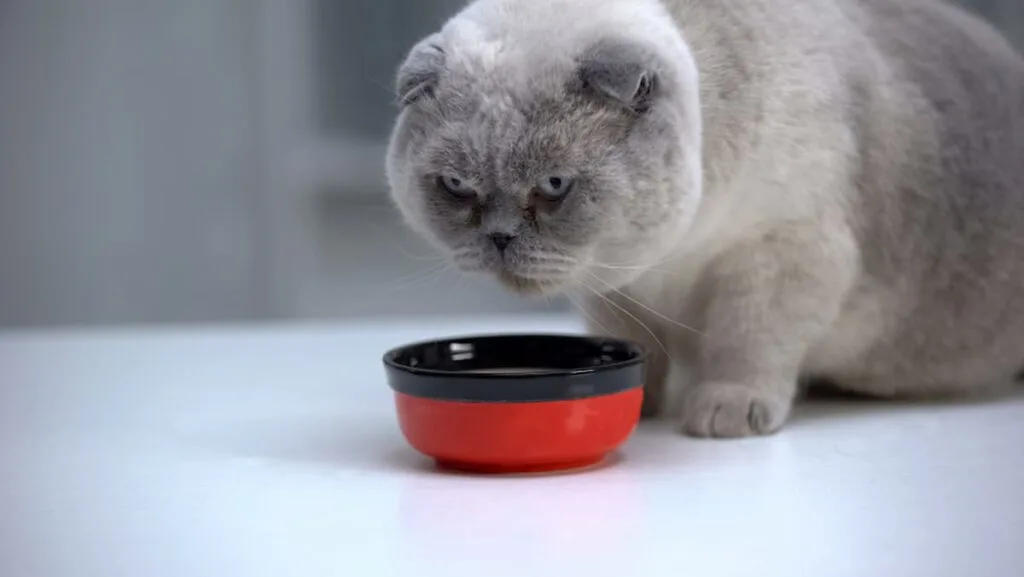
The Feline Digestive System
Understanding the feline digestive system is crucial for maintaining your furry friend’s health. In this section, we will explore the different parts of the feline digestive system, focusing on the mouth and teeth, stomach, and intestines.
Mouth and Teeth
Cats possess sharp, carnivorous teeth designed for tearing and cutting meat. Their saliva contains enzymes that begin to break down food as they chew. The tongue’s rough surface, covered with papillae, helps to move the food towards the back of the mouth and down the esophagus.
Stomach
Once the food reaches the cat’s stomach, gastric juices start breaking it down further, including hydrochloric acid and various enzymes. This acid helps to break down proteins, while the enzymes aid in the digestion of fats and carbohydrates.
The cat’s stomach muscles contract to mix the food and gastric juices, forming a semifluid called chyme.
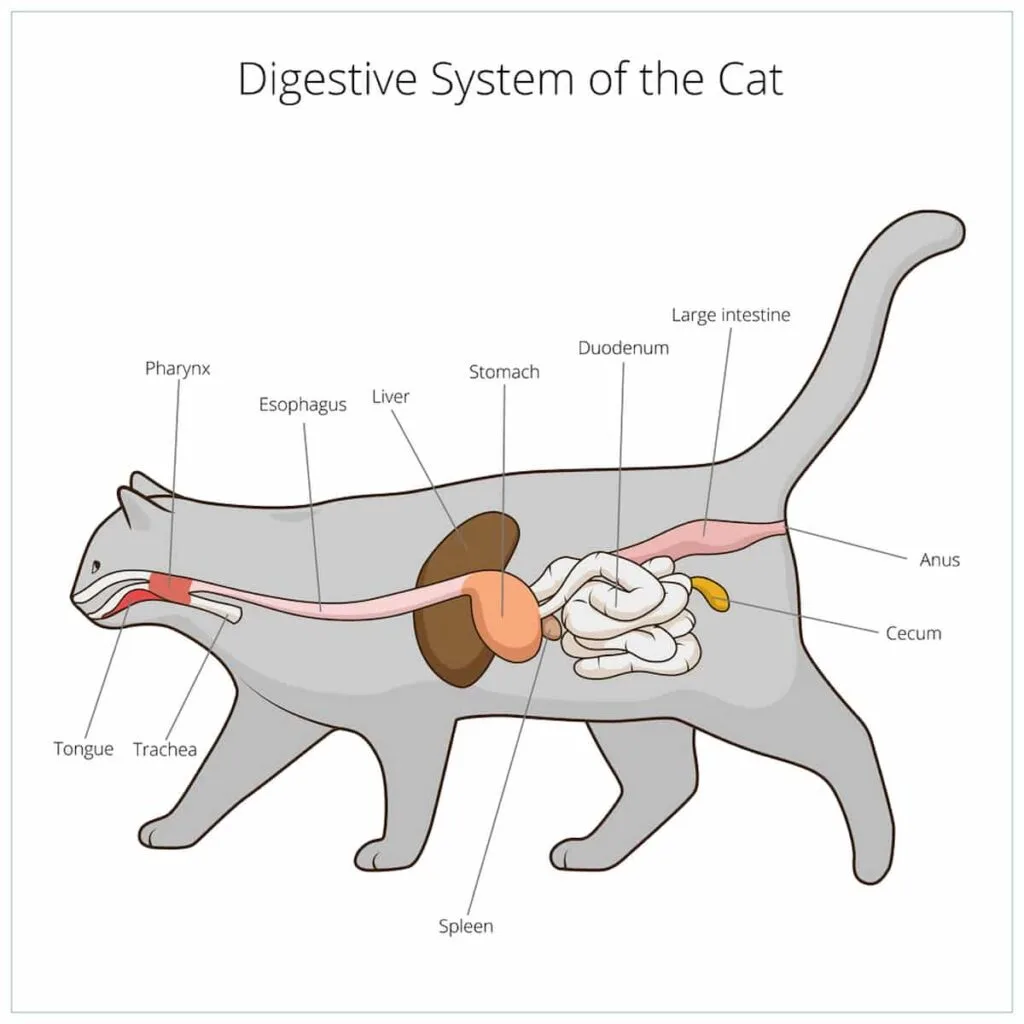
Intestines
The chyme then moves into the small intestine, where nutrients are absorbed into the bloodstream. The duodenum, the first part of the small intestine, is responsible for breaking down fats with bile from the liver and gallbladder. Bile neutralizes the stomach acid and helps to emulsify fats, making them easier to digest.
In the following sections of the small intestine, called the jejunum and ileum, nutrients such as amino acids, sugars, and vitamins are absorbed into the bloodstream through the intestinal wall.
Finally, the remaining undigested material makes its way to the large intestine, where water and electrolytes are absorbed, forming semi-solid feces which are later expelled through the rectum and anus.
Keeping this process in mind, it’s essential to provide your cat with a balanced and species-appropriate diet that caters to its specific digestive system.
Factors Affecting Digestion Speed
How fast a cat digests food depends on many factors which include: age, diet, and health conditions that impact the rate at which cats digest food. Let’s get into those next!
Age
Young kittens often have a faster digestion rate compared to adult cats. Their growing bodies require frequent feedings, and their digestive system is adapted for quick nutrient absorption. As cats age, their metabolic rate and digestive system may slow down, leading to longer digestion times.
Senior cats may also experience digestive issues that further affect the speed of digestion.
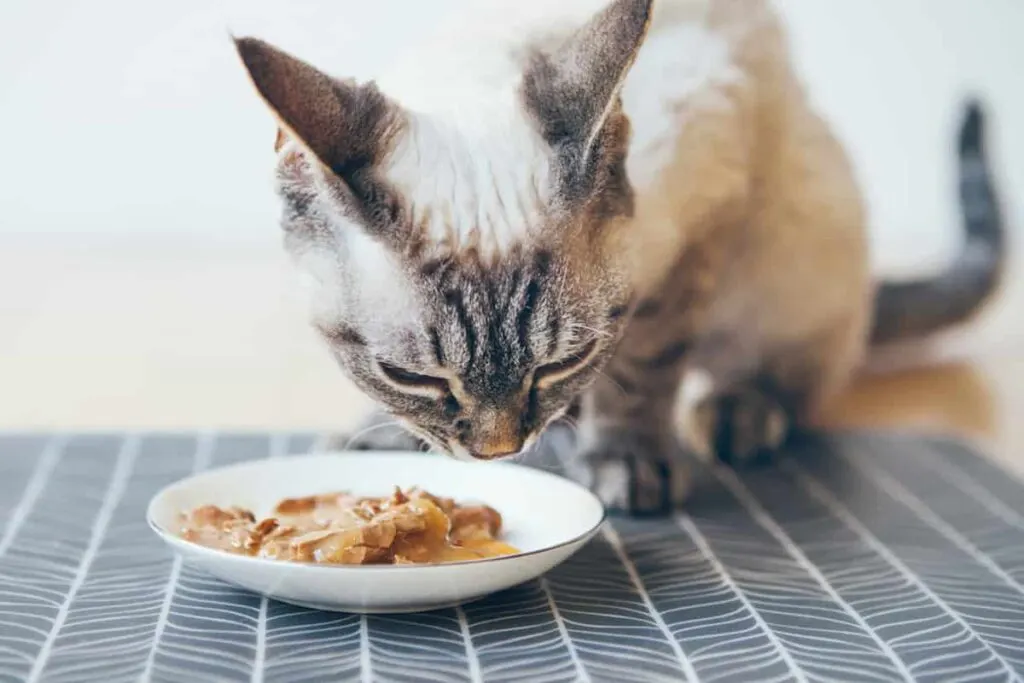
Diet
The type of food your cat consumes plays a role in its digestion speed. Cats are obligate carnivores, meaning their digestion is optimized for processing high-quality proteins and fats, as mentioned by NCBI.
Consuming food with high digestibility improves nutrient absorption and ensures a faster digestive process.
In contrast, consuming low-quality proteins, high-carbohydrate diets, or excessive fiber can slow down digestion and increase the time it takes for food to pass through your cat’s gastrointestinal tract. It is crucial to provide your cat with a well-balanced diet that meets its nutritional requirements for optimal digestion.
Health Conditions
Various health conditions can impact your cat’s digestion speed. Conditions affecting the gastrointestinal system, such as inflammatory bowel disease or parasites, can disrupt the normal digestive process and lead to longer digestion times.
Other systemic issues, like hyperthyroidism, can cause an increased metabolic rate that may result in a faster digestion speed. If you suspect that your cat’s digestion speed may be affected by a health condition, it’s essential to consult your veterinarian for further evaluation and appropriate care.
Understanding The Digestion Timeline
On average, it takes a cat between 10-24 hours to fully digest its food and excrete the waste product as feces. However, this timeline can vary based on factors such as the cat’s age, size, and health.
The digestive process starts in the stomach, where the food is mixed with stomach acids to break down the proteins. Cats have a simple stomach structure, and once it’s filled with food, it empties within a few hours as the food moves into the small intestine.
The small intestine is where most of the nutrients are absorbed into the bloodstream. As the food travels through the intestine, it’s further broken down by enzymes and absorbed. Depending on the cat’s digestive system, this process can take anywhere from 12-24 hours.
Ultimately, cat digestion varies from one feline to another.
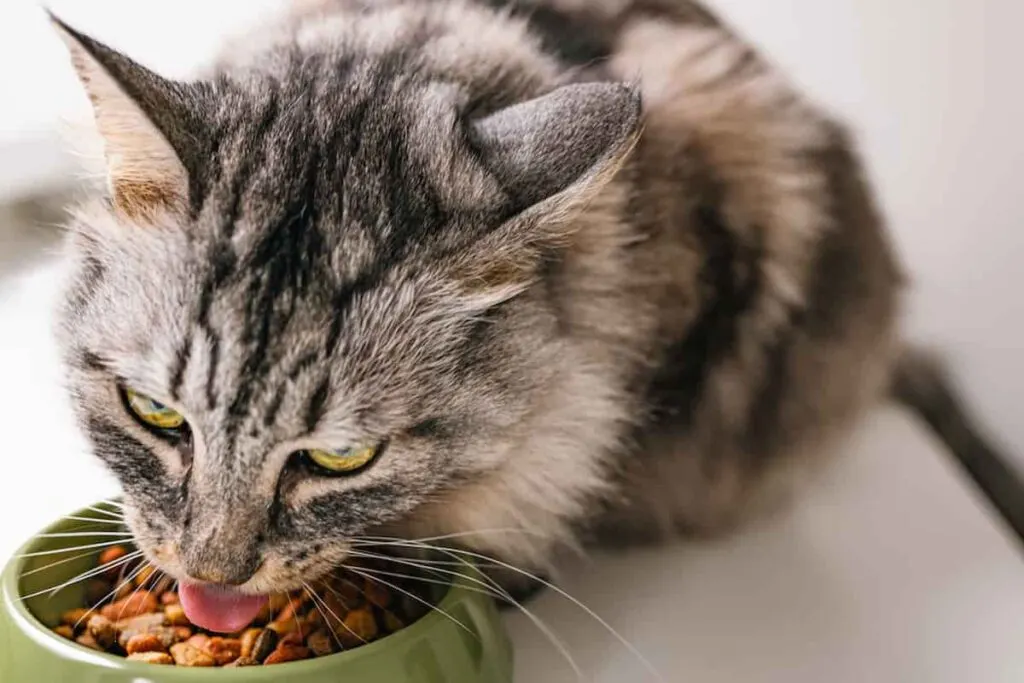
Signs of Digestive Problems in Cats
Although cats can usually digest food efficiently, there might be instances when your feline friend experiences digestive issues. It’s important to know the signs of digestive problems in cats so you can take proper action if needed.
Vomiting
Vomiting is a common symptom of digestive problems in cats. While occasional vomiting might be normal, frequent or severe vomiting could indicate a more serious issue. Common causes include hairballs, overeating, and gastrointestinal disorders. If your cat frequently vomits, it’s essential to consult a veterinarian for a proper diagnosis and treatment plan.
Diarrhea
Diarrhea is another sign of potential digestive problems in cats. Soft or liquid stools could result from a variety of issues, including dietary changes, stress, and infections. Ongoing diarrhea could lead to dehydration and weight loss, so it’s important to consult your vet if your cat is experiencing these symptoms regularly.
Constipation
Constipation in cats is characterized by infrequent or difficult bowel movements. It can be caused by factors such as a low-fiber diet, dehydration, or obstructions in the digestive tract.
Constipation can be uncomfortable and harmful to your cat’s health if not treated promptly. If your cat is having difficulty passing stools or showing signs of pain during bowel movements, it’s essential to consult your veterinarian for advice and treatment.
Keeping an eye out for these common signs of digestive problems in cats will help you ensure your feline friend’s digestive system stays healthy and functioning properly.
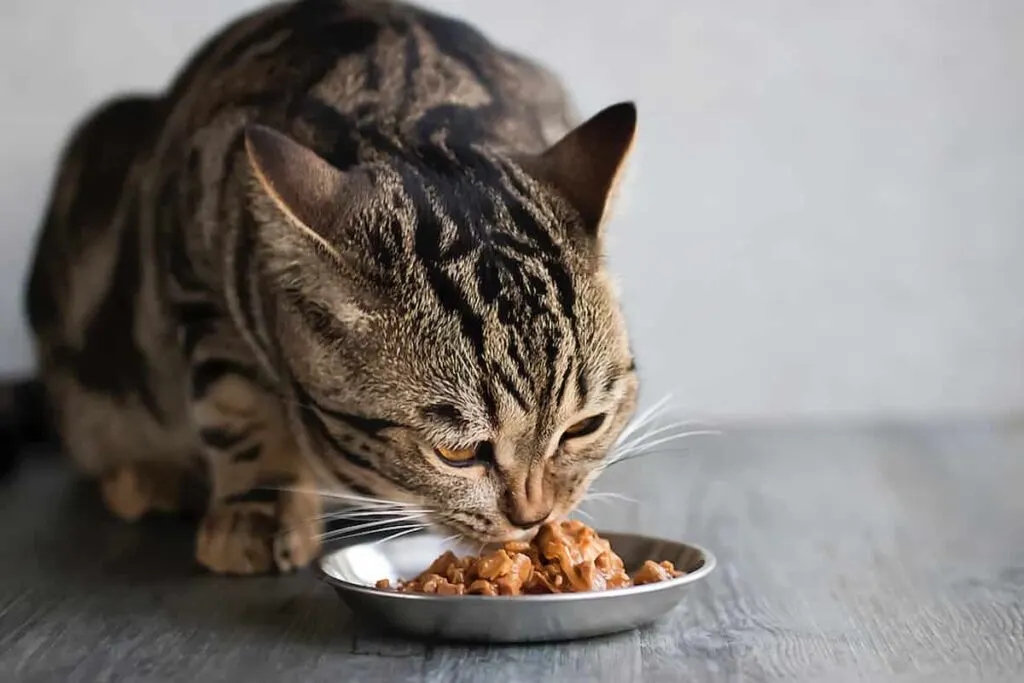
How to Support Your Cat’s Digestive Health
As a cat owner, you may wonder how to best support your cat’s digestive health. It all comes down to selecting good nutrition, routine feeding, and visiting the vet regularly.
Choosing the Right Food
Selecting the right food plays a major role in maintaining your cat’s digestive health. Opt for a high-fiber diet to help prevent hairballs and facilitate digestion. Additionally, consider incorporating probiotics to balance your cat’s intestinal bacteria, which are crucial for proper digestion.
Healthy Feeding Habits
Pay attention to your cat’s eating habits to ensure proper digestion. Encourage small, frequent meals throughout the day rather than one large meal. Maintaining a consistent feeding schedule will help regulate your cat’s digestion.
Remember always to provide fresh water for your cat, as hydration is essential for digestive health. Encourage water intake by placing multiple water bowls around your home or investing in a water fountain designed for cats.
Routine Check-Ups
Regular vet check-ups are crucial in catching any potential digestive issues early on. Be proactive and schedule annual appointments. If you notice any changes in your cat’s eating habits, stool consistency, or overall health, don’t hesitate to consult your veterinarian for proper guidance.

My name is James, and welcome to FAQCats!
Along with our team of cat owners, expert pet enthusiasts, and pet professionals, we aim to write engaging helpful, engaging content about cats. At FAQCats we strive to provide content that’s accurate and fun to read. Our team writes about everything related to cats; even the most complex of topics. Through extensive research and caring for our own fur-pals, we’re able to provide something cat owners worldwide will love. Have a look around, and leave us feedback anytime!
